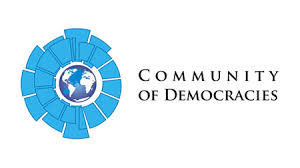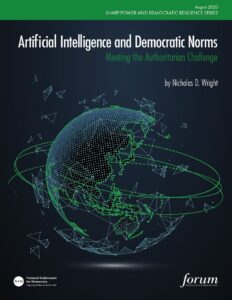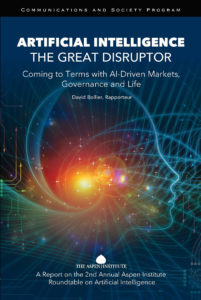 …..well, digitally, at least.
…..well, digitally, at least.
A global democratic alliance should set norms, rules, and guidelines for technology companies and agree protocols for cross-border digital activities including election interference, cyberwar, and online trade, argues Marietje Schaake, the international policy director at Stanford University’s Cyber Policy Center and an international policy fellow at Stanford’s Institute for Human-Centered Artificial Intelligence.
Citizens are better represented when a coalition of their governments—rather than a handful of corporate executives—define the terms of governance, and when checks, balances, and oversight mechanisms are in place, she writes for the MIT Technology Review.
 The Community of Democracies, a coalition of states that was created in 2000 to advance democracy but never had much impact, could be revamped and upgraded to include an ambitious mandate for the governance of technology. Alternatively, a “D7” or “D20” could be established—a coalition akin to the G7 or G20 but composed of the largest democracies in the world. What problems would such a coalition resolve? Schaake asks:
The Community of Democracies, a coalition of states that was created in 2000 to advance democracy but never had much impact, could be revamped and upgraded to include an ambitious mandate for the governance of technology. Alternatively, a “D7” or “D20” could be established—a coalition akin to the G7 or G20 but composed of the largest democracies in the world. What problems would such a coalition resolve? Schaake asks:
- The coalition might, for instance, adopt a shared definition of freedom of expression for social-media companies to follow. Perhaps that definition would be similar to the broadly shared European approach, where expression is free but there are clear exceptions for hate speech and incitements to violence.
- Or the coalition might limit the practice of microtargeting political ads on social media: it could, for example, forbid companies from allowing advertisers to tailor and target ads on the basis of someone’s religion, ethnicity, sexual orientation, or collected personal data. At the very least, the coalition could advocate for more transparency about microtargeting to create more informed debate about which data collection practices ought to be off limits.
- The democratic coalition could also adopt standards and methods of oversight for the digital operations of elections and campaigns. This might mean agreeing on security requirements for voting machines, plus anonymity standards, stress tests, and verification methods such as requiring a paper backup for every vote. And the entire coalition could agree to impose sanctions on any country or non-state actor that interferes with an election or referendum in any of the member states.
 Digital authoritarian competitors stand ready to exploit a lack of foresight in democracies and manipulate the development of global surveillance to serve their own interests, says a prominent analyst.
Digital authoritarian competitors stand ready to exploit a lack of foresight in democracies and manipulate the development of global surveillance to serve their own interests, says a prominent analyst.
Authoritarian regimes can turbocharge AI by training it on two types of data that liberal democracies should not similarly exploit or combine: “broad data” generated at volume on digital devices, and high quality “ground truth data,” such as tax returns and medical records, Nicholas Wright observes in “Artificial Intelligence and Democratic Norms,” the fourth in the “Sharp Power and Democratic Resilience” series from the International Forum for Democratic Studies. The report explores how to establish democratically accountable rules and norms that harness the benefits of artificial intelligence-related technologies, without infringing on fundamental rights and creating technological affordances that could facilitate authoritarian concentration of power.

Aspen Institute
KEY IDEAS
- Affording new models of “digital sovereignty” for use by liberal democracies. Authoritarian states advocate for digital sovereignty as a state-based model of control over the internet. There is a critical need to develop alternatives. Civil society can help think through new models that balance sovereignty with the protection of individual freedoms.
- Support tech–civil society collaborations and develop resilience. Civil society, in cooperation with government and big tech corporations where possible, can aim to correct market failures—like privileging advertising and marketing tools over individual privacy—by giving citizens the means to safeguard democratic integrity against malign information operations, while preserving essential openness of the information environment.
- Resist sharp power in international fora. Norm-setting and technical standardization of AI-related technologies happen at a global scale. Civil society should promote transparent, multistakeholder AI governance and develop AI standards that encourage democratic practices and individual privacy. RTWT







